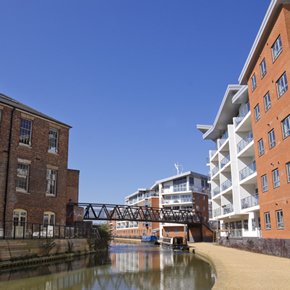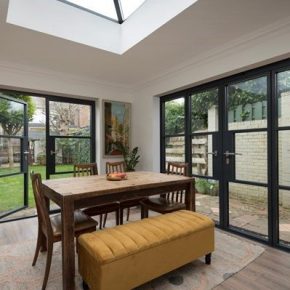
Residential acoustics explained
In contemporary Britain, the issue of noise within residential buildings is considered a health and safety issue, as well as an irritation. External noise sources – such as noisy neighbours and nearby traffic – are becoming increasingly problematic for occupants and, thus, detrimental to their health.
Hush Acoustics offers an explanation of residential acoustics, and information on what homeowners can do to reduce noise levels and soundproof their properties.
How does noise affect residential buildings?
According to Hush, there are three main sound sources that can affect residential buildings: airborne, impact and flanking transmission.
Airborne sound sources include music and TV, whilst impact sounds can include sudden noises, like footsteps. Flanking transmission is indirect sound transmission that bypasses a floor or wall system and travels through connected paths.
UK Building Regulations require that these noises are controlled to ensure comfortable living in residential buildings.
What can be done to reduce noise levels?
By specifying high quality acoustic products, which offer compliance with UK Building Regulations, the noise levels in residential buildings can be significantly reduced.
The most important regulations for residential builds are Approved Document E (England & Wales), Section 5 of the Scottish Building Standards (Scotland) and Approved Part G (Northern Ireland): these establish critical criteria for sound insulation performance for different types of residential accommodation, including multi-occupancy and single dwellings.
Approved Document E (England & Wales) has various requirements relating to sound, specifying that residential buildings should be protected against sound from other parts of the building and adjoining buildings; reverberation in common internal parts of buildings containing flats or single occupancy rooms.
These requirements are enforced by two methods: pre-completion testing (PCT) and Robust Details (RD). New build, refurbishment and change of use residential developments that are not built by means of Robust Details, require PCT to determine their compliancy with building regulations.
Robust Details are separating wall and floor constructions that are built to specific requirements set out by Robust Details Ltd. They do not require pre-completion testing.
Planning for effective soundproofing
Hush believes that early acoustic advice is crucial to achieve effective levels of soundproofing.
By attaining early design advice, architects, contractors and developers can be assured that their project will achieve compliance with UK Building Regulations and Standards, minimising the potential for failures.
This also reduces the need for costly and disruptive remedial measures later on.
The planning and design process requires designers to consider the noise exposure of the residential site, factoring in internal and external sources. Internal factors include building layout, acoustic screening, reverberation control and room acoustics, and protection from communal areas.
External factors include outside noises such as road traffic, railways, noisy neighbours and other local influences.
Hush Acoustics Ltd
Unit 2, Tinsley Industrial Estate
Shepcote Way
Sheffield
South Yorkshire
S9 1TH
Tel: 0114 551 8685
Fax: 0151 944 1146
Visit Supplier's page
Latest news

24th April 2024
The lowdown on Origin’s New Soho Offering
Origin’s Soho External Door is the first launch in its new generation of products, setting a higher standard for the fenestration industry.
Posted in Access Control & Door Entry Systems, Aluminium Products, Architectural Ironmongery, Articles, Building Industry News, Building Products & Structures, Building Systems, Doors, Innovations & New Products, Posts, Restoration & Refurbishment, Retrofit & Renovation, Security and Fire Protection
24th April 2024
Mitsubishi Electric welcomes new code of conduct for smart appliances
Mitsubishi Electric welcomes a new code of conduct on energy smart appliances which the European Union (EU) announced yesterday at the Hannover Fair in Germany.
Posted in Air Conditioning, Articles, Building Industry Events, Building Industry News, Building Products & Structures, Building Regulations & Accreditations, Building Services, Exhibitions and Conferences, Facility Management & Building Services, Heating Systems, Controls and Management, Heating, Ventilation and Air Conditioning - HVAC, Plumbing, Retrofit & Renovation, Seminars, Sustainability & Energy Efficiency
24th April 2024
Hamworthy Heating expands CIBSE approved CPD modules with new hot water series
Hamworthy Heating, technical experts in commercial heating and hot water products, announce the expansion of its market leading CIBSE approved Continuing Professional Development (CPD) portfolio with the launch of three new learning modules.
Posted in Articles, Building Industry Events, Building Industry News, Building Products & Structures, Building Services, Continuing Professional Development (CPD's), Facility Management & Building Services, Heating Systems, Controls and Management, Heating, Ventilation and Air Conditioning - HVAC, Plumbing, Retrofit & Renovation, Seminars, Training
24th April 2024
New technology partnership brings Passivent ventilation products to IESVE
Passivent has partnered with Integrated Environmental Solutions (IES) to make a number of its products available to model within the Virtual Environment (VE) platform IESVE.
Posted in Air Conditioning, Articles, Building Industry News, Building Products & Structures, Building Services, Facility Management & Building Services, Heating, Ventilation and Air Conditioning - HVAC, Information Technology, Innovations & New Products, Posts, Retrofit & Renovation, Roofs, Ventilation
 Sign up:
Sign up: